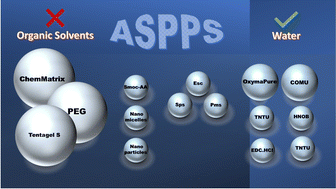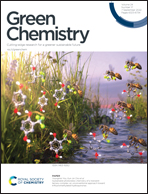Advances in solid-phase peptide synthesis in aqueous media (ASPPS)
Abstract
Peptides have been gaining ground in the pharmaceutical arena, with a total of 22 approvals over the last six years. These molecules are also present in antibody–drug conjugate constructs as linkers or payloads, or both. Solid-phase peptide synthesis (SPPS) is the method of choice for peptide synthesis. The introduction of an automatic synthesizer facilitated this methodology and helped in reducing the amounts of the required solvents. However, there are still concerns regarding the amounts, as well as the safety profiles, of the solvents involved in SPPS. Here, we discuss the work addressing the use of water as the greenest alternative to the common non-green solvents employed in various steps of the SPPS methodology. Various technologies were introduced which enabled the synthesis of di- and up to decapeptides in aqueous media with satisfactory yields and purities.

- This article is part of the themed collection: Green Chemistry Reviews


 Please wait while we load your content...
Please wait while we load your content...